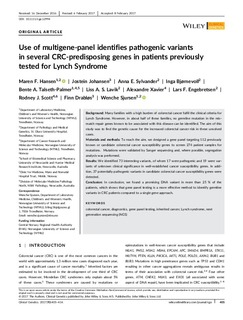| dc.contributor.author | Hansen, Maren | |
| dc.contributor.author | Johansen, Jostein | |
| dc.contributor.author | Sylvander, Anna Elisabeth | |
| dc.contributor.author | Bjørnevoll, Inga | |
| dc.contributor.author | Talseth-Palmer, Bente Anita | |
| dc.contributor.author | Lavik, Liss Ane | |
| dc.contributor.author | Xavier, Alexandre | |
| dc.contributor.author | Engebretsen, Lars Fredri | |
| dc.contributor.author | Scott, Rodney | |
| dc.contributor.author | Drabløs, Finn Sverre | |
| dc.contributor.author | Sjursen, Wenche | |
| dc.date.accessioned | 2018-01-18T14:30:27Z | |
| dc.date.available | 2018-01-18T14:30:27Z | |
| dc.date.created | 2017-06-20T21:44:39Z | |
| dc.date.issued | 2017 | |
| dc.identifier.citation | Clinical Genetics. 2017, 92 (4), 405-414. | nb_NO |
| dc.identifier.issn | 0009-9163 | |
| dc.identifier.uri | http://hdl.handle.net/11250/2478204 | |
| dc.description.abstract | Background
Many families with a high burden of colorectal cancer fulfil the clinical criteria for Lynch Syndrome. However, in about half of these families, no germline mutation in the mismatch repair genes known to be associated with this disease can be identified. The aim of this study was to find the genetic cause for the increased colorectal cancer risk in these unsolved cases.
Materials and methods
To reach the aim, we designed a gene panel targeting 112 previously known or candidate colorectal cancer susceptibility genes to screen 274 patient samples for mutations. Mutations were validated by Sanger sequencing and, where possible, segregation analysis was performed.
Results
We identified 73 interesting variants, of whom 17 were pathogenic and 19 were variants of unknown clinical significance in well-established cancer susceptibility genes. In addition, 37 potentially pathogenic variants in candidate colorectal cancer susceptibility genes were detected.
Conclusion
In conclusion, we found a promising DNA variant in more than 25 % of the patients, which shows that gene panel testing is a more effective method to identify germline variants in CRC patients compared to a single gene approach. | nb_NO |
| dc.language.iso | eng | nb_NO |
| dc.publisher | Wiley | nb_NO |
| dc.rights | Navngivelse-Ikkekommersiell 4.0 Internasjonal | * |
| dc.rights.uri | http://creativecommons.org/licenses/by-nc/4.0/deed.no | * |
| dc.title | Use of multigene-panel identifies pathogenic variants in several CRC-predisposing genes in patients previously tested for Lynch Syndrome | nb_NO |
| dc.type | Journal article | nb_NO |
| dc.type | Peer reviewed | nb_NO |
| dc.description.version | publishedVersion | nb_NO |
| dc.source.pagenumber | 405-414 | nb_NO |
| dc.source.volume | 92 | nb_NO |
| dc.source.journal | Clinical Genetics | nb_NO |
| dc.source.issue | 4 | nb_NO |
| dc.identifier.doi | 10.1111/cge.12994 | |
| dc.identifier.cristin | 1477699 | |
| dc.description.localcode | © 2017 The Authors. Clinical Genetics published by John Wiley & Sons A/S. Published by John Wiley & Sons Ltd. This is an open access article under the terms of the Creative Commons Attribution-NonCommercial License, which permits use, distribution and reproduction in any medium, provided the original work is properly cited and is not used for commercial purposes. | nb_NO |
| cristin.unitcode | 194,65,15,0 | |
| cristin.unitname | Institutt for klinisk og molekylær medisin | |
| cristin.ispublished | true | |
| cristin.fulltext | original | |
| cristin.qualitycode | 1 | |

